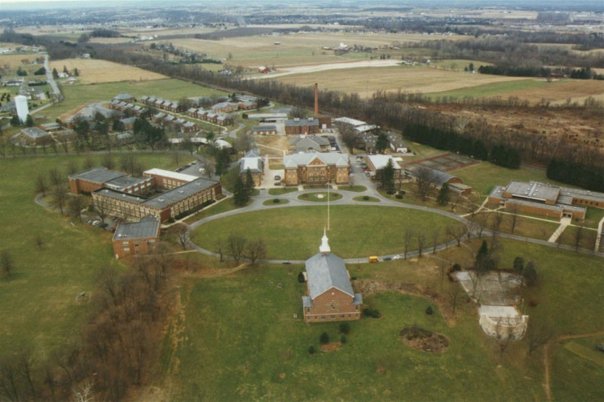The prospect of using a 169-acre property in Greene Township, once home to the Scotland School, to house unaccompanied minors arriving in the United States appears to have cooled, but not without sparking debate in Franklin County.
A key issue is zoning. Now home to Camp Malka, a Jewish summer camp for girls enrolled in 6th to 10th grades, the facility has not been the subject of any formal proposal presented to township officials, although a preliminary proposal was submitted and rejected, township officials said. And the current zoning would not accommodate such a facility anyway, they added.
The township’s supervisors conducted an open forum on Sept. 10, and numerous residents voiced worries. A particular concern residents mentioned was frustration that local control could be superseded by interests of unknown businesses from outside the area, or policies of the federal government.
Some residents feared housing migrant children at a Franklin County property would be a public safety hazard. A woman interviewed before the Sept. 10 Greene Township meeting said, “Our concern is we have no idea who these people are. They’re unvetted, and we don’t know if they’re involved in gangs, drug trafficking or sex trafficking.”
Camp Malka is owned by MSLH LLC, a company based in Lakewood, N.J. The inquiring third party who approached the township is USA UP Star, a company headquartered in Greenwood, Ind., township officials noted.
Another factor that worried local government officials was the potential resource depletion a large group of migrants and their caretakers could cause. While it was never definitively proposed how many migrant children might transfer there, Camp Malka advertises accommodations for up to 1,000 students/campers at their current facility. This property contains more than 70 buildings, which include a large dining hall, chapel, auditorium, 36 cottages and other support structures.
Regarding the potential transfer of migrants, Franklin County Commissioners released a statement saying in part: “We have significant concerns about the impact on our county. While these minors would be housed on the Scotland campus, the influx of support staff– and their families– would be overwhelming to our local communities.”
The commissioners suggested a substantial and sudden addition to the county’s population would stress the housing market and cause increased demand for other vital services such as water, sewer and trash removal. The commissioners added the proposed use could potentially push the operative limits of school systems, public safety personnel and the criminal justice system.
A third concern is tied to increasing numbers of migrant children detained by the U.S. government. Refugees are categorized as unaccompanied minors, unaccompanied children, individuals in a family unit or single adults.
U.S. Immigration authorities encountered an estimated 152,000 unaccompanied minors at the Southwest U.S. Border in fiscal year 2022, an all-time high. According to the Council on Foreign Relations, 72 percent of minors now held in American federal custody are aged 15 or older. Several state and local politicians hoisted this border-centered red flag, tying the proposed Greene Township property use to the national immigration policy issue.
And then there are politics. Incumbents state Sen. Doug Mastriano (R) and state Rep. Rob Kauffman (R) issued a joint statement that said in part: “We are united in our opposition to illegal immigrants being housed by federal government contractors in Franklin County.” They added, “We join with our neighbors, friends and constituents committed to defend Franklin County from the foreign invasion coming from our southern border.”
Mastriano also commented in a television interview, “If this goes into effect here, we’ll see lawlessness. This will be a dangerous community; people will be fleeing because of the crime. It’s going to be devastating to this community.”
While many conservatives in Franklin County place blame for this potential local migrant housing situation on the Biden administration’s immigration policies, Greencastle-based Democrat Cameron Schroy, now a state senatorial candidate, said the county commissioners offered practical logistical concerns about the proposed migrant transfer, and added, “Any opposition to the project should end there.”
Schroy said his ancestors immigrated to the area in 1750, and that heritage reflects the country’s spirit of inclusivity. “It’s absurd that legislators would swoop in and make media hay,” Schroy said, when discussing public statements made by his opponent Mastriano and other conservative officeholders. “If they’re trying to stir hysteria for their own political gain that is just shameful.”
A starting point is the history of the Scotland School property.
The Pennsylvania Soldier’s Orphan’s Industrial School was founded in 1895. The property served as an accredited residential educational facility for children, many of whom came from poor, abusive or challenging backgrounds. During the school’s 114-year history, more than 10,000 children graduated, and former students achieved distinguished careers in the military and other fields.
Later renamed the Scotland School for Veterans Children, the institution’s reputation was enhanced by its close-knit campus life, competitive sports teams and supportive alumni. Several hundred students lived on campus each school year. Funded by the State of Pennsylvania, this once-vital school closed due to budget cuts in 2009. In an interview conducted when the school doors closed, one tearful alumnus said, “This place was my home.”
After its closure, several attempts to redevelop the property took place during the next decade. The Winebrenner Seminary, a Church of God evangelical-based group chartered at Harrisburg in 1825 (now headquartered in Ohio), tried establishing a satellite campus at the old Scotland School, but that effort stalled.
Another enterprise promoted mentorship for athletes at the Scotland site; it too dissolved. Since this property’s buildings were originally designed for a unique education and housing purpose, finding an appropriate successor after the Scotland School closed proved difficult.
Mike Ross is the President of the Franklin County Area Development Corporation and is familiar with this former school property. He said basic upkeep of the land and buildings would likely cost $1.5 to $2 million each year. “Redevelopment for this type of property is a major challenge,” Ross said.
The property was eventually bought by an investor, who then sold it in March 2024 for $9.1 million to MSLH LLC. With decreased use during the last several years, some campus buildings suffered decay and other maintenance issues. However, the new owner has reportedly invested money to refurbish the property. “Some buildings still need work, but most public spaces are in great shape,” Ross said.
The zoning for this property dates back to Greene County’s initial plan, established in 1973. It was always designated as R-1, which is low-density residential, but the Scotland School pre-dated this zoning decree and was grandfathered into a special exemption for its remaining 36 years.
The current New Jersey property owners, MSLH LLC, were not available for comment but described the summer camp’s mission on their website. The Scotland-based Camp Malka is a place to “give your daughter an adventure.” The word Malka is a name of Hebrew origin, which means “queen,” or “princess blessed by god.” Another Camp Malka, under the same ownership, was located in Far Rockaway, N.Y. (on Long Island near New York City), but that camp has closed.
The Camp Malka website also has an application process for 11th and 12th-grade girls to serve as camp counselors. The site conducted its first seasonal programs this summer. The owners also advertise the property’s availability for hosting special events throughout the year.
Named for Revolutionary War General Nathanael Greene, this property is located in a township with an estimated 2024 population of 18,500, up from 12,284 counted during the 2000 census. The township grew the fastest (36 percent) from 2000-2010. That trend slowed to 10 percent growth between 2010-2020.
The Scotland community has approximately 1,300 residents. Greene Township encompasses 57 square miles, and its demographics show a population that is 96 percent white, 1.5 percent African American, with the remaining 2.5 percent consisting of other minority groups.
The township’s government is managed by three township supervisors. Those current officeholders are Todd Burns, Travis Brookens and Shawn Corwell. Zoning is managed by Daniel Bachman. These officials have publicly commented on the Scotland property’s inquiry.
The Aug. 17 response letter to USA Up Start, written by Zoning Officer Bachman, is published on Greene Township’s website. It reads in part: “While the site is currently referred to as Camp Malka, for zoning purposes the current use would be considered a boarding school where religious education study and retreat periods are offered for finite periods of time.” As described by USA Up Star’s inquiry to provide more permanent shelter, Bachman ruled that the proposed new purpose would “not be a permitted use in the R-1 (low-density residential) Zoning District.”
Bachman said he interpreted the relevant Greene Township zoning ordinance correctly, as it was written and intended, and his decision was impartial. Bachman also notified USA Up Star that an appeal could be filed for a special zoning exemption, with no deadline imposed. But, at present, Bachman said neither the property owner (MSLH LLC) nor the supposed third-party agent (USA Up Star) has indicated any intention to appeal.
While efforts to contact USA Up Star by phone and email went unanswered, information on their website describes the contractor’s profile. An owner named Klay South founded the company. He is a former U.S. Marine and twice-decorated Purple Heart recipient who served in Iraq.
USA Up Star specializes in “global disaster responses.” The organization delivers base camp support solutions across public and private sectors by “deploying its workforce with state-of-the-art equipment.” This includes products such as containerized housing units, food service facilities, power generators and material handling equipment. They operate warehouses and staging yards in Texas, Georgia and Indiana, with a business development office in Houston.
Considering this appeal process and other factors, Ross said the local migrant housing plan “appears to be a non-issue. It’s doubtful it will be resurrected.” While Ross couldn’t guarantee the chances this proposal would ever resurface were absolute zero, he guessed that number was close to accurate as an educated industry assessment.
Regardless of the likelihood these unaccompanied minor migrants will ever transfer to Franklin County, the passionate local response illustrated how these opinions could manifest anywhere across the country.
Most citizens would likely agree that unaccompanied migrant children, once detained in the U.S., require humane living conditions until they are returned to their country of origin or assigned to American-based relatives or sponsors.
But after the recent local opposition surfaced, it appears likely a sizable number of Franklin County residents would prefer those migrants be held elsewhere. This response could be compared to a proposed location for a new airport. In that situation, while many would understand the need for such a project, they typically wouldn’t want it placed in their back yard.






















